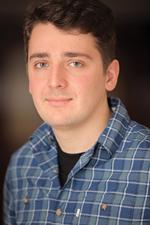Glasgow scientist wins top UK award
Published: 19 November 2013
Dr Martin Lavery, a post-doctoral researcher from the School of Physics and Astronomy, has been awarded the Scopus Young Researcher Award for 2013.
 Dr Martin Lavery, a post-doctoral researcher from the School of Physics and Astronomy, has been awarded the Scopus Young Researcher Award for 2013.
Dr Martin Lavery, a post-doctoral researcher from the School of Physics and Astronomy, has been awarded the Scopus Young Researcher Award for 2013.
A member of the Optics research group at Glasgow, Martin was the winner in the physical sciences category.
The competition was open to all UK researchers who had not been published before 2010. A jury of experts selected the winners based on publication and citation data drawn from Scopus, Elsevier’s abstract and citation database.
His published research into the properties and applications of orbital angular momentum – the property of light that gives it a twist – was a big factor in winning the award. "One of the big things for this award was a paper in Physical Review Letters that has now got over 110 citations. It was a method to sort the modes of orbital angular momentum in a light beam without having to use a filter. This technique then got taken on by quite a few labs."
This field of research can be applied to increase the data capacity of optical communications systems and detect the rotation of distant bodies.
Martin started at Glasgow as an undergraduate and has since gone on to complete a PhD within the Optics group. He feels the research environment at Glasgow has been a major contributor to his success.
"You get a lot of contact time with the professors in this group. Having that regular contact with academics who are leaders in their field makes a huge difference.
"There is also community feel to this group where everyone supports each other. There is always someone to bounce ideas off." he says.
Professor Miles Padgett, Dean of Research for the College of Science and Engineering, commented on the award: "This is a great achievement for Martin and well-deserved for the excellent contribution he's made to the research of optics, especially in the area of orbital angular momentum."
Martin is continuing his research career at Glasgow with an EPSRC doctoral prize fellowship. He will be working closely with the School of Engineering and international partners to explore the integration of orbital angular momentum modes into technology.
First published: 19 November 2013
<< 2013 Archive

